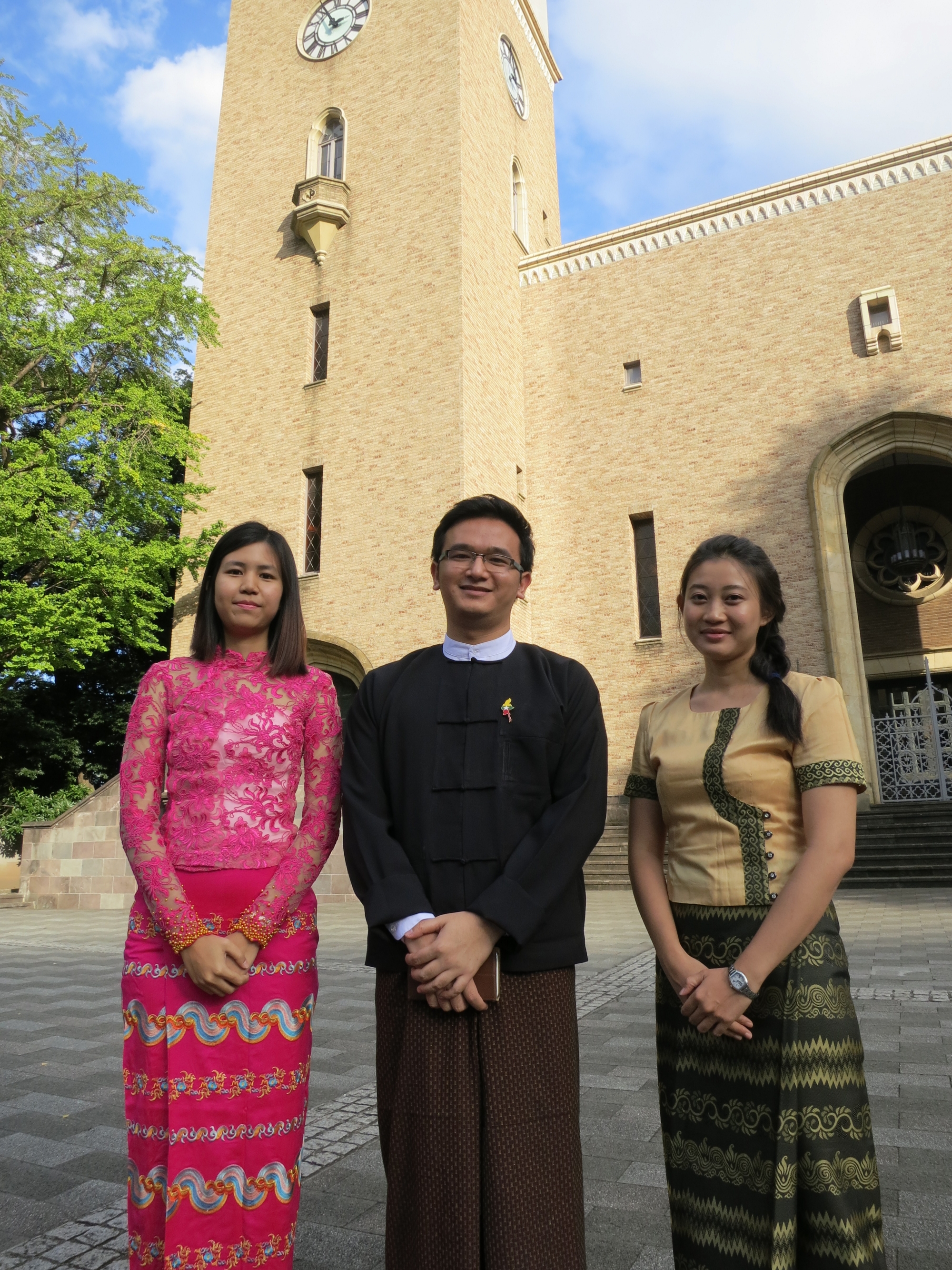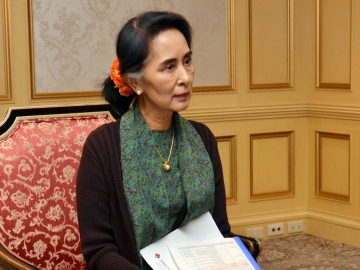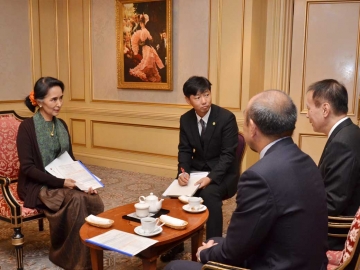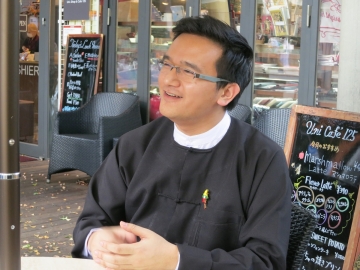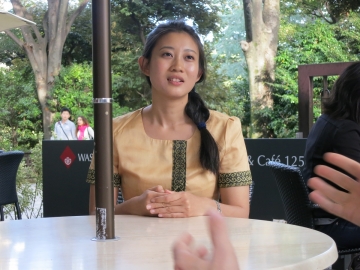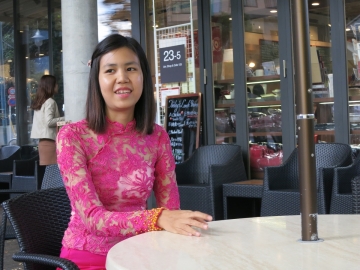Students from Myanmar inspired to serve their country
Mon, Nov 7, 2016-
Tags
Committed to helping Aung San Suu Kyi for a better future of Myanmar as academics
On November 2, Waseda University President Kaoru Kamata and Vice President for International Affairs Norimasa Morita greeted Aung San Suu Kyi, the world-renowned democratic reform leader and 1991 Nobel Peace Prize winner. Now the State Counsellor of Myanmar, she came to the Rihga Royal Hotel Tokyo and spoke in front of Japan’s Myanmar community, including the 16 students from Myanmar currently enrolled at Waseda University. President Kamata and Vice President Morita informed Aung San Suu Kyi about how dedicated the students from Myanmar are to their studies and to use their knowledge for their country.
Myanmar emerged from military rule in 2011 and has been undergoing major political changes ever since. Waseda University has agreements with the University of Yangon and Yangon Technological University. Furthermore, to recruit talented students with potential to become international leaders, Waseda University provides a wide array of support for its students, including the special scholarship established in September 2014 for graduate students from Myanmar. This covers full tuition and fees, such as admission fee and a monthly stipend.
Special Scholarship Program for Students from the Republic of the Union of Myanmar
On this occasion of Aung San Suu Kyi visiting Japan, we interviewed three Waseda students from Myanmar. In Part 2, we asked what it is like for the students living in Japan and about their future goals.
- Thant Zin Oo, 2nd year student at the Graduate School of Political Science
- Wint Wint Aung Khaing, 1st year student at the Graduate School of Political Science
- Thit Oo Kyaw, 1st year student at the Graduate School of Creative Science and Engineering
My family allowed me to study abroad because my destination was Japan
International students in Japan face many hurdles, such as obtaining student visas, financing living expenses, and finding housing. Fortunately for students from Myanmar receiving the special scholarship, teaching and research assistant positions are available. “Being a teaching assistant has allowed me to meet many professors,” Khaing said. “The professors take interest in Myanmar, so this is a chance for me to build my network. They are very helpful, reminding me that they are always available if I need something. Also I work as a teaching assistant for a course in economics, I can learn about a different field aside from politics.”
Waseda has special international dormitories. Kyaw lives in Waseda’s international dormitory for female students located in Tanashi, about a 30-minute train ride away from the Waseda campus. She said she was recommended to live in a dormitory by Thant. “He told me that living in a dormitory would be a better decision because everything would be easier. Besides, the dorm manager is a very kind woman. Although she cannot speak English, she always tries to communicate with me.” Kyaw finds living in Japan convenient, especially the transportation. She also mentioned that she likes Japanese food but longs for spicy food from Myanmar from time to time. “When that happens, I usually go to the Myanmar Restaurant in Takadanobaba (a neighborhood near Waseda),” she said with a smile.
(For undergraduate students, visit the Waseda International Student House website)
Thant, a graduate student from the first group admitted through Waseda’s special scholarship program, spoke about the complications he faced because of the difference in customs. “In Myanmar,” Thant said, “Credit cards are almost non-existent. Although we were provided with information on procedures for renting housing, the students from the first batch didn’t know how to go about it. I didn’t know we had to pay deposit money, and we had to buy everything [appliances and furniture], which cost us a lot of money. Also, in order to obtain a residence card in Japan, you need to have an address. And, to find accommodation, you need a bank account, which requires a residence card. I felt as if we were going in circles.”
Furthermore, families of young women like Khaing and Kyaw may be worried about safety when sending their daughters abroad. However, Khaing said, “Even though my parents were worried about me, they felt Japanese culture is similar to Myanmar’s, which is full of people with kind hearts.” Kyaw added, “My family allowed me to study abroad because my destination was Japan. It is very safe here, and people are polite.”
Overcoming challenges because of the supportive Myanmar network
Students like Thant, Khaing, and Kyaw were helped to overcome challenges because of the supportive Myanmar network in the Takadanobaba area. When Thant faced trouble finding housing, his Myanmar seniors helped him look for a place. “Without the help of my seniors, I couldn’t have made it. Even though there is information available in English, the situation is completely different from Myanmar. It’s better for us to look after our juniors.”

Returning home and serving their people in academia
After finishing their studies, the three Myanmar students intend to return home and serve their country in academia. When he came to Japan, Thant decided that becoming a professor teaching politics and philosophy would be better in order to “fill in the gap” in knowledge about politics in Myanmar. Because the Waseda scholarship program sponsors students for five years (two years for a master’s degree and three for the doctorate), Thant plans on getting a Ph.D. from Waseda.
Nurturing the Myanmar society
On the need to develop a modern society, he said, “Myanmar people are naturally very good. That’s why we have great leaders such as the third Secretary-General of the United Nations, U Thant, and Aung San Suu Kyi. However, to create a better society in Myanmar, we need to be nurtured systematically. Japanese people are naturally good people and they are also nurtured. My goal is to take part in nurturing the Myanmar society. I believe in the natural goodness of the Myanmar people and would like to share our values with the world.”
Sharing precious knowledge for the country
Khaing’s dream is to become a researcher, but that requires a lot of experience. “I want to continue learning here,” she said. “When I go back to Myanmar, I want to establish an institution for studying political science. I believe the people of my country need to learn about what is happening in the world. Myanmar needs to advance its higher education, and I would like to become a professor and contribute my knowledge. Learning a lot of things in Japan is definitely good for my country. It is our duty to share what we have learned here with our people. It is very precious knowledge. This is my dream, and it will come true if I believe in it.” After obtaining a Ph.D. from Waseda, Khaing said she would like to work in Japan to gain more experience before returning to Myanmar.
Using technological expertise for economic development
Kyaw believes she can help fill the technological gap between Myanmar and Japan with the doctorate she intends on obtaining. “I consider myself a valuable human resource. Maritime industry is very important for Myanmar’s economic development, considering that we have a 2000 km coastline. We need more people to study this field, so with my expertise, I believe I can contribute to my country. The rector of my former university, Myanmar Maritime University, has asked me to work there as a teacher when I return to Myanmar. I want to share my knowledge with the next generation.”
I have a dream, and I believe I can achieve anything
There are many highly-educated Myanmar people abroad, but until recently, many felt they did not have a place in their own country because their experiences would not be valued. However, Myanmar’s political transition is creating new opportunities for people to be part of changing the country for the better. Thant said, “I remember in one of her speeches Aung San Suu Kyi said, ‘The youth of today, you are the future. Don’t you want to create your own future?’ On a different occasion, she also said that, ‘This time is not about waiting for a place to go, but it is the time to create your own place.’ I was enlightened by her words, which have totally changed our attitudes. We are ready to take on whatever tasks and to create our own paths. Change is happening now.”
Khaing also feels excited by the future prospects of Myanmar. “I was a very shy girl,” she said. “That’s what a traditional girl in Myanmar is like. Also, there are many people in Myanmar who are passive and live without a dream. Maybe that’s because of our culture. But, I am very lucky to have come here. I have a dream, and I believe I can achieve anything. I was able to receive a scholarship from Waseda, so I feel privileged and appreciate this incredible opportunity.”
Thant pointed out an interesting point on the scholarship they are receiving. “This scholarship is incomparable to other scholarships, such as the ones provided by Japan’s Ministry of Education, Culture, Sports, Science and Technology (MEXT) and Japan International Cooperation Agency (JICA). Most available scholarships are G2G (government-to-government), which are limited to applicants working for the government. However, the scholarship at Waseda University is very special because it is about people to people. It is open to anyone from Myanmar who aspires to become a leader. With other scholarships, we wouldn’t have had this chance. I believe at other universities, this kind of arrangement would not have been possible, so I want other people from Myanmar to know about it. Moreover, the scholarship is especially for students to study creative engineering and political science because those fields are what my country needs to build a better future.”
Towards the end of the interview, Thant left us with an encouraging message for Myanmar students who wish to study abroad. Although this scholarship is for the graduate level, he mentioned that Waseda is “a magical word,” for its reputation is so widely recognized. “[Graduating from Waseda University] prepares you for a good career. Many parents are concerned about the cost of studying in Japan. It may seem expensive, but it is more affordable compared to some other countries. Furthermore, studying at Waseda will give you chances to meet international students and build a global network, which will lead to better opportunities. It is a worthy investment in your future.”
Waseda University is committed to providing the best educational environment for those who are driven to change the world. On this occasion of Aung San Suu Kyi’s historic visit, we look forward to deepening of bilateral relations and the vital roles these inspirational students will certainly play in the future of their country.
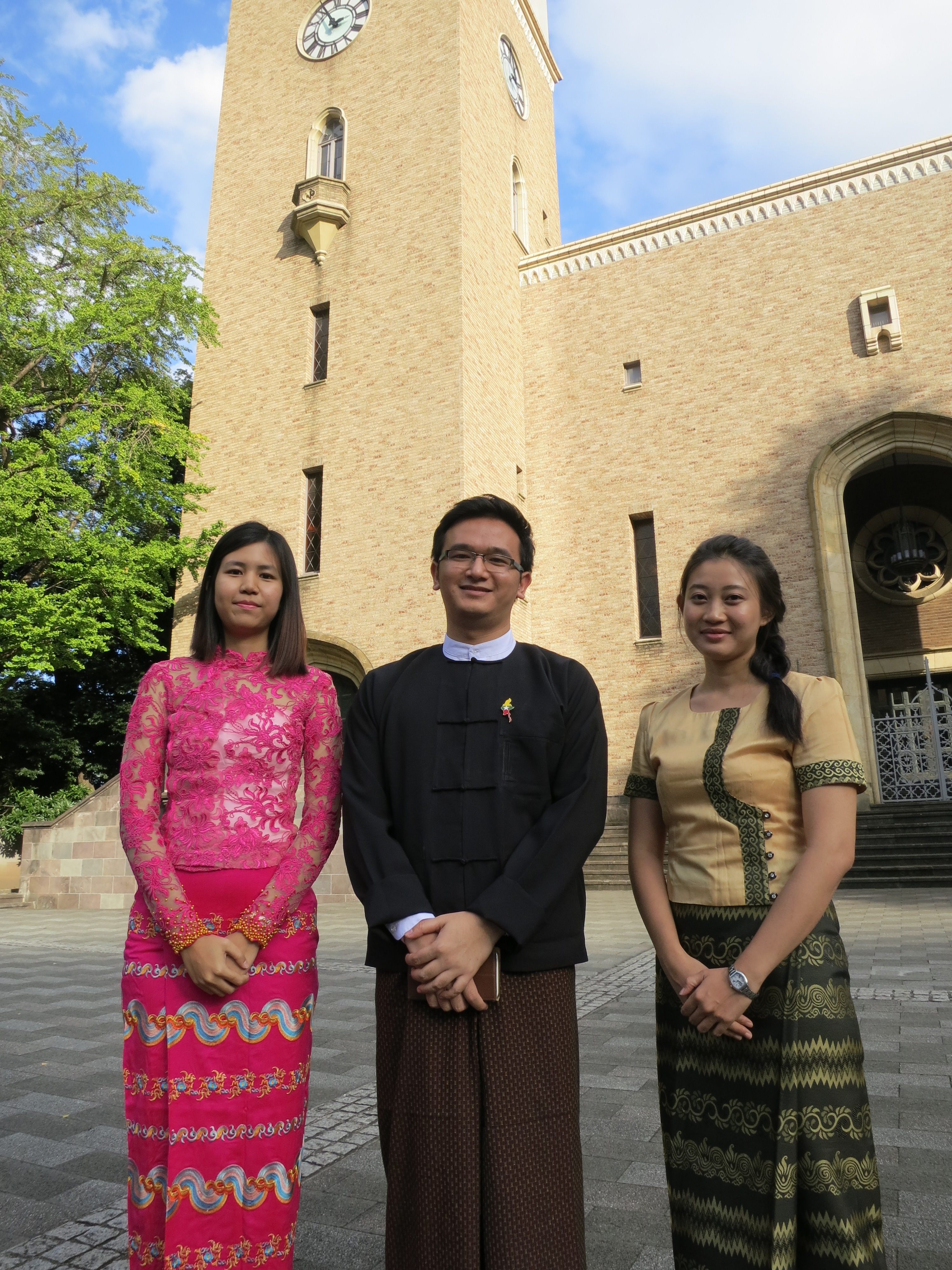
This interview has been edited for clarity and length.
Part 1 of this interview is available here
Messages from the students
https://www.youtube.com/watch?v=Tuj-Vd6I-kY
https://www.youtube.com/watch?v=3osgq5KC89c
https://www.youtube.com/watch?v=YBCAEl7QzGo


